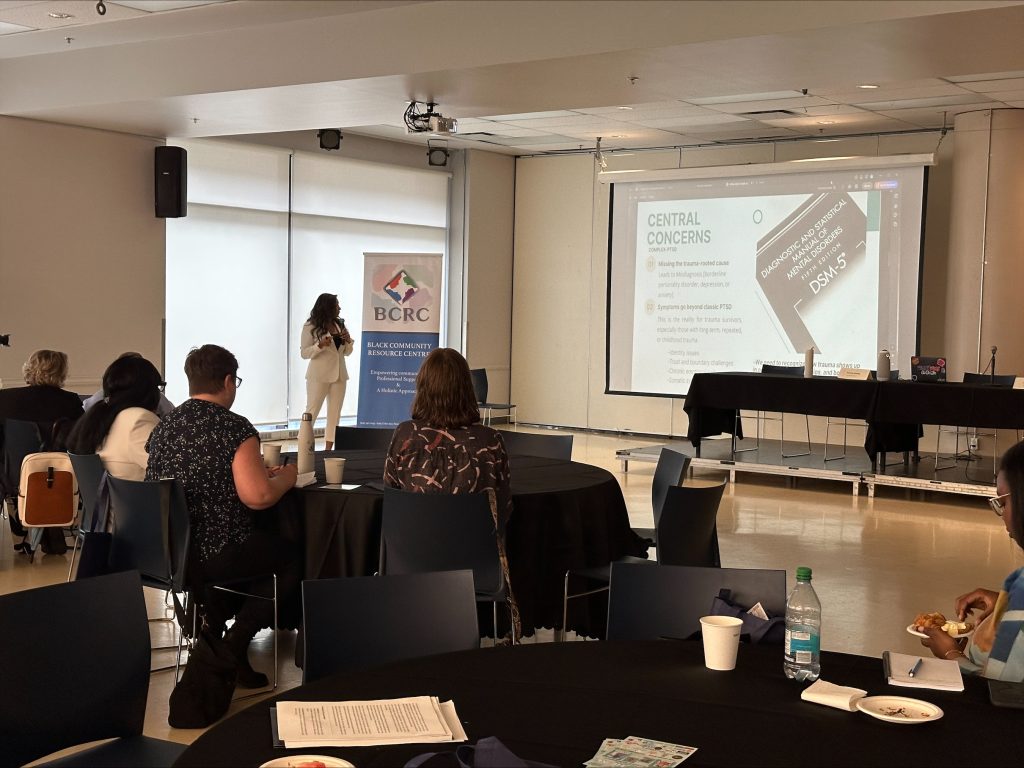Exploring the mental health stigma, obstacles faced by Montreal’s Black community

Posted February 15, 2022 5:37 pm.
Last Updated February 15, 2022 5:41 pm.
As Montrealers in the city’s Black community say they face many challenges when seeking help with their mental health, experts say it’s important the person across them understands where they are coming from.
“When you do have a Black therapist, there are things that are cultural that you understand at a deeper level than someone who doesn’t experience Blackness on a daily basis doesn’t necessarily understand,” said Samanta Nyinawumuntu the founder and director of the Black Healing Centre.
“Stigma about mental health has existed in a lot of communities, especially of the Black community, a lot our parents and grandparents have been doing a lot of work with surviving for the past couple of decades. So moving through the system, they haven’t had a lot of time or excess money to be able to access mental health therapy. They haven’t been allowed in schools where mental health is being taught.”
The centre’s mission is to create an accessible and safer space for Black people to gather, connect, and heal. It’s described as an anti-oppressive, anti-racist community hub where people of African descent feel seen, heard, and supported.
The centre’s mission is to “create an intentional space” by Black people, for Black people, where there is a sense of belonging, and where experiences don’t have to be explained diminished or defended.
“I don’t want to have to explain myself, so I keep it in, so there’s stuff that don’t get communicated,” says Hanifah Daniel, a mental health intern at the Black Healing Centre.
“I come from a Caribbean background and growing up you re not really taught to express yourself.”
Katya Stella Asso, the co-founder and creative operations coordinator at the Black Healing Centre, says the way Blackness is experienced and perceived by others affects the way one interacts with the world.
“So having to explain our Blackness in the workplace and then having to explain that in a therapist’s office – somewhere that’s supposed to be a safe space – I don’t want to be explaining myself or defending my Blackness with somebody, that even with accurate training, there are just some things that can’t be explained,” said Asso.
Some say there are still a lot of taboos and barriers surrounding seeking mental health help in some Black communities.
“I was told within my community, you know, drink green tea, pray, ask God to help you. Meanwhile, it was getting worse and worse and the only thing that I needed at the time was medication,” said Petrona Joseph, a mental health advocate and author, speaking of her own challenges.
Asso says getting therapy in Western society is a privilege that many immigrant Black communities can’t afford to even think about.
“That’s a white person problem,” she said. “We’re worried about paying the bills. We’re worried about feeding you. We’re worried about you getting a job, and being respectable members of society. Worrying about being sad, like why are you sad? You have a roof over your head, you are fed and of course, those are important things, but as second-generation immigrants, there’s so much more than that. Mental health is important.
“Whereas us, we’re privileged to have all of those necessities where we want more. We have already achieved so much comfort. We already have basic housing food shelter, whatnot, now, we’re worried about our mental health and our feelings.”
Experts add it’s the deeper understanding of the perspective – or rather the lack of it – when dealing with a person of another race that can also create barriers.
“It is possible to be a white therapist and have Black patients, but you need to be culturally competent,” said Nyinawumuntu. “You need to understand the intersecting cycles of oppressions that Black folks have to navigate on a daily basis. You have to understand our history.”
Added Joseph: “Perhaps unbiased training can be in place as well, because when you meet another person of another race, you’re always confronted with a lot unconscious biases and you might not be aware of some of the obstacles we may face within our community.”








